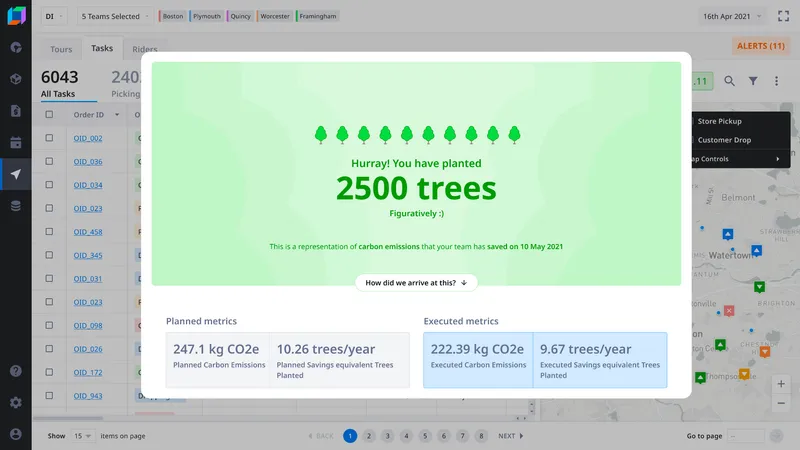Green logistics: Paving the way for sustainable supply chains
The major goal of green logistics is to move and deliver raw materials and finished goods at the lowest possible cost while maintaining the highest standards and minimising environmental effects in the process.
Environmental consciousness is at the forefront of global discussions today. Though almost all industries need to switch to sustainable operations, one industry, in particular, can have the biggest impact out of all, i.e. logistics and supply chain.
Logistics, while considered the backbone of both domestic and global commerce, also is a major source of carbon emissions. According to the World Bank, transport-related emissions currently account for nearly 20% of global energy-related CO2 emissions, a figure projected to rise by 60% by 2050 if left unaddressed.
Enter green logistics, born out of the necessity to align supply chain operations with environmental stewardship. This approach integrates sustainability principles into the fabric of supply chain management, offering alternatives for reducing carbon footprints while optimising operational efficiency.
The need for green logistics
As of 2024, sustainability has emerged as a top priority worldwide, echoing the sentiments of a 2022 McKinsey report which revealed that 90% of supply chain executives consider sustainability extremely important for their business. Against the backdrop of global energy transition goals outlined in the 2023 Global Energy Perspective report, the logistics industry faces mounting pressure to adopt eco-friendly practices that mitigate climate impacts and uphold commitments to the Paris Agreement.
Traditional logistics practices have long been associated with environmental harm, stemming from reliance on fossil fuels, inefficient routing, and excessive packaging. The urgency to address these issues has led to the rise of green logistics, a holistic approach that seeks to minimise environmental impact while optimising the efficiency of supply chain operations.
Top factors that influence green logistics
Logistics is the sum of a multitude of little but significant tasks that occur throughout the supply chain process. The major goal of green logistics is to move and deliver raw materials and finished goods at the lowest possible cost while maintaining the highest standards and minimising environmental effects in the process.
So, let's understand some pertinent factors that organisations can consider to make “green logistics” a reality:
Optimised logistics operations
Innovations in supply chain digitisation and automation are enabling major efficiency gains. As per the World Economic Forum, comprehensive digitalisation in logistics can reduce carbon emissions by 20%.
Data analytics helps plan optimal transport routes, loading, warehouse locations and more to minimise mileage. Machine learning improves demand forecasting and inventory management. Autonomous vehicles automate haulage and transfer jobs efficiently. Drones and robots enable faster last-mile deliveries with fewer emissions. Big data and real-time visibility across end-to-end supply chains also aid smarter carbon accounting. Accurately quantifying emissions is the first step to managing and reducing them. For instance, SAP Logistics Business Network launched by DHL provides shippers with analytics like carbon footprint dashboards for informed decision-making.

Eco-friendly packaging solutions
Excessive packaging has long been a concern in logistics, contributing to both waste and increased carbon emissions. Green Logistics emphasises the use of eco-friendly packaging materials and the adoption of sustainable packaging practices. Even the end consumers are demanding companies opt for recyclable and biodegradable packaging materials, reflecting a growing commitment in society to reduce the environmental impact of packaging.
Focus on circular logistics
Transitioning to a circular economy model holds promise for further reducing carbon emissions and waste within logistics operations. Circular strategies, grounded in principles of resource efficiency and waste minimisation, offer a pathway towards sustainable practices. Though specific projections for India aren't available yet, it is deduced that carbon emissions can go down as much as 50% if circular strategies are implemented in logistics operations across Europe.
Initiatives such as Loop, a circular shopping platform operating across multiple countries, exemplify the potential for circular logistics to redefine consumption patterns and minimize environmental harm. Likewise, reverse logistics optimised through IoT and RFID technologies enable efficient collection and recycling of goods, reducing the need for long-distance transport and minimising carbon footprint.
Collaborative efforts and industry initiatives
The shift towards green logistics necessitates collaboration across industries and stakeholders. Large-scale projects such as the Green Corridor initiative (to fund the electric transmission system in India) and the adoption of eco-friendly warehouses and electric vehicles underscore the collective effort required to drive sustainable change.
The future of green logistics as a business imperative
Embracing green logistics is not merely a moral imperative but a strategic business decision. As consumers increasingly prioritise sustainability, companies that lead the charge towards eco-friendly supply chain practices stand to gain a competitive edge.
In conclusion, the journey towards net-zero logistics presents challenges and opportunities alike. Sustainability-focused logistics could unlock significant opportunities, almost $50 billion in new revenues by 2030. By embracing sustainability principles and fostering collaboration across supply networks, the logistics industry can pave the way for a more environmentally conscious and resilient future.
(Nishith Rastogi, Founder and CEO at Locus, is responsible for business expansion across geographies and heads product globally.)
Edited by Kanishk Singh
(Disclaimer: The views and opinions expressed in this article are those of the author and do not necessarily reflect the views of YourStory.)








